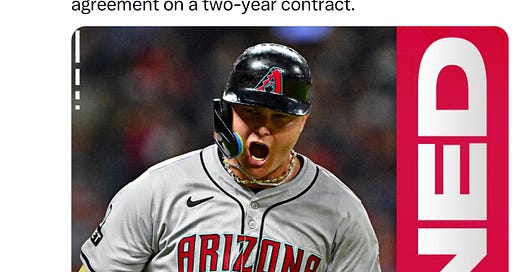We spend a unit in my SMU class covering contract law, starting with the mechanics of what makes a legal, binding contractual agreement. The first two elements are as one might expect: an offer, and an acceptance of that offer.
The third and final element is a little trickier, one that we cover in one night of our undergrad class but that, in law school, can take up a few weeks: an exchange of consideration.
Now, that can be monetary. Or it can be a product. Or a service.
Or a promise.
According to overnight reports, the Rangers and Joc Pederson agreed on a contract that is specified to last two years and pay the 32-year-old $37 million, unless Pederson chooses unilaterally to terminate halfway in.
And here’s the thing about sports contracts: the consideration being exchanged is one promise for another.
A promise to pay — for a promise to play. Not a promise to produce. The money in baseball is guaranteed. All that’s guaranteed from Pederson is that he’ll report to work for the Rangers, and not some other team.
Owning a pro sports franchise and paying for its players is an expensive leap of faith. An educated leap, you hope, but a leap nonetheless.
There’s no promise that Pederson, an 11-year vet coming off of career highs in batting average (.275), on-base percentage (.393), OPS (.908), and OPS+ (151), will outproduce Nathaniel Lowe in 2025 and 2026, even though he’s set to earn something in the range of 50 percent more than Lowe, while likely not playing much defense or facing many southpaws.
Those two will inevitably be compared these next two years, as the Pederson deal was reported less than 12 hours after the trade of Lowe to the Nationals, one clearly a precursor to the other as the Rangers aim to reload while staying under the luxury tax line. It wasn’t a shocking development that Pederson chose this deal; the Rangers have been connected with him by the local and national media all winter. It just wasn’t going to happen without a major payroll adjustment first. As it turns out, the adjustment and the signing were practically completed in lockstep.
The contractual promise is to play, not to produce, but track record gives the Rangers reason to believe the production will be there. As Nick Deeds (MLB Trade Rumors) points out, Pederson’s 135 wRC+ over the last three seasons is the 16th-highest mark in baseball, just behind Vladimir Guerrero Jr. and just ahead of Jose Ramirez. Much of that recent success for Pederson has featured minimized usage against left-handed pitchers, which stands to continue in Texas. He’s a righty-destroyer, and — like fellow addition Jake Burger — feasts on velocity (slugging .636 against four-seam fastballs last year), a specific point of emphasis for the Rangers this winter. Pederson and Burger will be looked to as key contributors to the effort to revitalize the offense, whose 95 wRC+ as a group was 22nd in the league last year. At DH alone, only the Reds were less productive than Texas’s 65 wRC+.
Pederson is also considered a strong veteran presence — just as Lowe is — and that’s not an unimportant part of what he brings.
Deeds adds this: “With Pederson now in the fold, RosterResource projects the Rangers for a payroll of just under $217MM for 2025, and that figure jumps up to just over $229MM for luxury tax purposes. That leaves around $11MM left for the club to work with before the first luxury tax threshold.” Evan Grant (Dallas Morning News) views it slightly differently, suggesting the Pederson deal only puts the CBT number at about $223 million, which would leave $18 million to play with and still avoid the tax.
Either way, Texas isn’t done At the very least, there is a closer, and probably a set-up man, to add to the bullpen Whether the Rangers can manage both with that $11 million, or even 18 million, seems fiscally challenging. Perhaps another contract (Jon Gray or Leody Taveras) will be moved, just as Lowe’s was.
That’s the part the Rangers can control — their end of the bargain, the money that goes out. They can’t control the outcomes they’re paying for, but that’s just how baseball works. The team is in the business of projecting and maximizing, and they’ve certainly been creative and aggressive in that process. The rest of making that agreement pay off is up to the player.
On to the next contract.






Gray as set up to Yates would be nice
You forgot the 4th element of a contract, the transaction must be legal. If not, the other 3 elements are moot. Couldn’t resist.